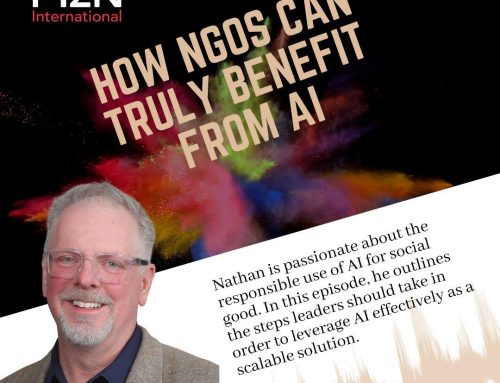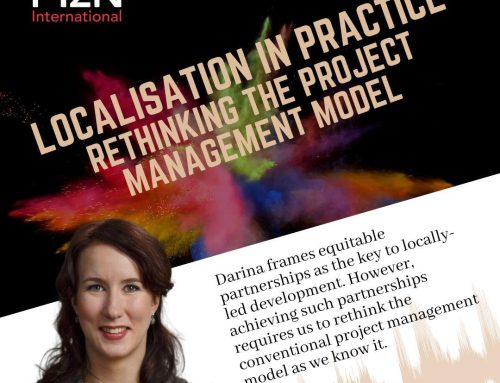The need to change an organisation is constant. Non-profit organisations should beat the permanent catch-up playing and disruptive, expensive restructuring projects. But how? At MzN International, we explore how we can keep up with the changing environment without having to constantly go through reorganisation projects.
The world is constantly changing and so is the environment in which NGOs, UN and government agencies operate. The expectations and demands from beneficiaries, governments, donors and other external partners change faster than ever, especially when it comes to the pressures to improve programmatic and financial transparency. Technology is paving the way for organisations to have more data and be more evidence driven than ever before, but it also requires new ways of organising management to use the data and turn insight into action.
Yet, non-profit organisations are failing to keep their operating models up to date and adapt to the changing environment. Organisations struggle to deliver the impact in the world that they have set up due to operational inefficiencies, outdated financing models and non-agile structures.
One reason is that even though the need to change is ever increasing, the way we are changing is not. We have observed many non-profits that find themselves constantly playing catch-up – trying to launch one restructuring project or strategy after another. By the time the restructuring is done, the demands and environment have changed once more, and we need to restructure again, and again…
This is not the most effective way to keep up with the hyper-competitive environment, fast-paced context changes and amazing technological opportunities. We believe that there is a cheaper and better alternative available.
Incremental Organisational Development
Rather than periodic large-scale change projects, non-profit organisations should be constantly checking their operating systems and the way they work. Using a set of external and internal parameters and factors that steer the organisations’ evolution and learning not only makes the operational change more evidence-driven, it finally ends the endless reorganisations. Internally, at MzN International, we refer to this as incremental organisational development.
Organisational change should be as constant as the change happening around us. For NGOs to succeed in the long term, we need to install the ability to identify and respond to internal inefficiencies and adapt the requirements as a matter of routine practice. This constant evolutionary capacity will keep the organisation nimble, self-critical and evolving. It is a much less stressful and cost-effective way to change compared to endless restructuring projects.
One-off restructuring may be necessary from time to time to deliver drastic change, for example when reacting to large context changes or to quickly correct major inefficiencies, but it is not the right solution to adapting to change. Simply drastically restructuring an organisation will not necessarily create the capacity to deal with the emerging technology, new funding models or beneficiary demands, nor will it ensure that the organisation adapts in the long term. So, why spend time doing it if there’s a simpler way?
Evolution vs. Restructuring
The key to avoid constant restructuring is to build an organisation that is always evolving. This can be done by introducing mechanisms that take a good, hard look at the structure, processes, performances and systems within the organisation, and do this on a regular basis. Think of it like an internal monitoring and evaluation function, but for an organisation.
Most organisations may not have the in-house mechanisms to drive change and meet the expectations of external players. My colleagues and I have created low-intensity, periodic Operational Capacity Assessment Tools (known as the “MzN OCAT”), which deliver a real-world view of the agency’s true capacities in reference to its strategy ambition, both at a board and ground-level view.
In recent years, our clients have found the comparative assessment – comparing the organisation to its peers – to be particularly helpful. The key advantage is that the organisation can demonstrate – and verify – its evolution and ability to adapt. Remaining responsive and flexible means that staff, beneficiaries and donors can expect – rather than hope for – the organisation to be ready to change with the new realities and pro-actively act upon opportunities to create more impact.
The periodic OCAT compliments the change instruments available to management:

An Ounce of Prevention… Saves Money, Time and Nerves
Restructuring projects can be expensiv and lengthy, often taking months to complete. They are accompanied by anxiety and stress in the organisation, with the hope that it will ensure that the organisation is fit for purpose afterwards. Monitoring and evaluation work, on the other hand, can be done for around 20 per cent of what organisations usually cash out for the average restructure or change process – in a shorter amount of time. MzN International monitors the operational performance of several non-profit organisations. We do not bill more than this amount– which helps organisations save in the long run.
Waiting for your organisation to be in a situation where it is so far behind in the catch-up game that it has no other option than to restructure is not cost-effective. Instead, we need to be monitoring and evaluating what is in place and adapt as we go along. We can help monitor the processes and practices according to our indicators and come to a conclusion about how well an organisation is responding to change.
Think about it like this: You don’t just go to the dentist when your teeth are falling out – you go every six months to keep everything in check where the dentist may tell you a cavity is developing. You then get it fixed before it gets out of hand and the tooth has to be removed. You monitor and observe the process and ensure you take all the precautions you can to avoid the major event of the tooth needing to be removed .
Similarly, you don’t just have an operation once your health is so bad that it’s your last option. You try to stay healthy and may have smaller surgeries to ensure you can go on living your life to the fullest.
NGOs and other non-profit agencies should do the same. Don’t simply restructure and keep playing catch-up with the constant change. Get ahead of the game and start monitoring and evaluating your organisation’s performance to ensure that you can evolve with the change instead.





